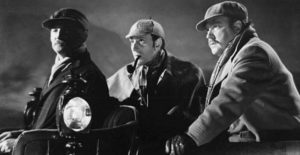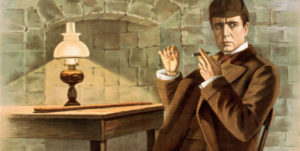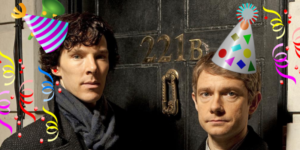There’s a great podcast called “I Hear of Sherlock Everywhere,” and while for some characters, that might mean they occupy the category of ‘so ubiquitous as to be categorically uninteresting,’ Sherlock Holmes seems to occupy, at this point, more of a bible-like space of open interpretation wherein we each relate to this character in our own unique way, and see our own selves reflected in his actions, no matter what those selves might be. Perhaps this is due to Sherlock’s status as perpetual outsider; to those of us who feel a certain foreignness no matter where we may be standing, or merely to the observationally inclined, his outsider status is infinitely relatable, and allows the character to transcend gender, class, race, epoch, and of course, genre.
Beyond helping us feel better about our own status as outsiders, Sherlock is also a figure that brings the whole mystery community together. Conan Doyle’s work has been appreciated by generations of crime and mystery fans, in a variety of ways specific to those generations and universal to fans through time. We decided, as the year draws to a close, to gather a variety of these interpretations of Sherlock together, to showcase the vast breadth of Sherlockian fandom. The essays below are split between these meanings—individual expressions of Sherlock as outsider, and Sherlock as the foundation of the crime fiction community. These meanings are perhaps more complementary than they seem, for when we relate to Sherlock Holmes, we know without a doubt that we will relate to others who also appreciate him, and we also know that those we relate to about Sherlock will, like the Great Detective himself, most likely be a little odd.
“The Politics of Sherlock” by Lyndsay Faye
While Sherlock Holmes, as a representative of ultimate rationality, has oft been appropriated as a symbol of conservatism, Lyndsay Faye, in in this article on the political Holmes, shows how wrong it would be for readers to make the assumption that Sherlock is some staid supporter of middle class norms and British Empire: “Holmes practically bit his thumb in the direction of most of the aristocracy, openly praised America, lazed about experimenting with a variety of chemicals, paid street urchins rather exorbitant sums to ferret out his clues for him, and composed avant garde odes on his fiddle—his entire attitude is indicative of the “Bohemian” man of modest (albeit later considerable) means.”

“What If Sherlock Holmes Was Wrong About Everything?” by Noah Berlatsky
In this playful essay, Noah Berlatsky looks at the work of Pierre Bayard, a critic who has written a number of works resolving crimes in classic novels, and how Bayard restores a sense of mystery to the detective novel by casting doubt on the author’s own solutions. To reopen the cases of a virtuoso detective, only a virtuoso critic will do, and the reader of this article may enjoy—or be dismayed by—the Great Detective’s solution to The Hound of the Baskervilles getting picked apart.
“The Art of the Painstaking Sherlock Recreation” by Rebecca Romney
To paraphrase Jane Austin, it is a universally acknowledged truth that a fictional place, if popular enough, will be recreated in real life by an eccentric American. Here, rare books dealer Rebecca Romney guides us on a tour of an exact replica of 221 Baker Street, located in Pennsylvania basement, and lovingly crafted (complete with secret passageway behind a bookcase!) by Sherlockian Denny Dobry.

“Sherlock Holmes Versus The Supernatural” by James Lovegrove
“How does an empirical mind like Holmes’s handle things for which there is no straightforward explanation? How can he bring his formidable talents to bear on events that defy logic?” Sherlock versus the Supernatural is a more popular trope than you might guess—after all, what could be more maddening to this ultimate symbol of rationality (and entertaining for the reader) than to be confronted with the irrational, monstrous, and deeply weird? Here, James Lovegrove assembles a reading list of Sherlock’s many confrontations with the occult, the supernatural, and the inexplicable. The truth is out there. And Sherlock will find it.
“Searching for a Soul Mate: Must Love Sherlock Holmes” by Iris Martin Cohen
“I could always read stories of my one true love, secure in the knowledge that he would appreciate me.” Iris Martin Cohen remembers her emotional love affair with Sherlock Holmes, her real-life affair with a poor substitute, and how she found a balance between the romance of fiction and the romance of real life. Cohen speaks to the mutability of the character—Sherlock can simultaneously be a reflection of who we are, what we want, and what we wish we no longer needed.

“Kareem Abdul-Jabbar and the Evolving Sherlock Canon” by Lyndsay Faye
Here, Lyndsay Faye interviews athlete, activist and author Kareem Abdul-Jabbar about his Mycroft Holmes series, and it’s everything you would want out of a conversation with two of the most passionate Sherlockians around, as the two dive into the joys of research, the art of the Sherlock pastiche, and how approaches to the character continue to evolve to this day.

“Crafting The Perfect Sherlock Pastiche” by Sherry Thomas
“As good as the canon stories are, they are still the products of their time. And as inventive an author as Arthur Conan Doyle was in his plots and in his most enduring character, he did not dig as deep into the mind and psyche of Sherlock Holmes as later writers did.” Sherry Thomas, author of the Lady Sherlock series, takes us through the wild and woolly world of Sherlockian pastiche, “the collective name for that vast body of reinterpretations from other creators featuring Sherlock Holmes & Co.”
“Inside a Legendary Sherlock Extravaganza” by Lyndsay Faye
In this charming account of the Baker Street Street Irregulars’ annual celebration of Sherlock Holmes’ birthday, Lyndsay Faye guides us through the past, present, and future of the party in the mystery world. Although with festivals, awards, and many many organizations, the crime community does appear to throw a lot of parties.





















